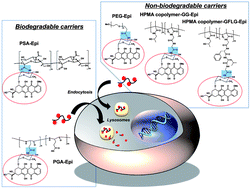This paper explores the potential of polysialic acid (PSA) as a carrier for low molecular weight anticancer drugs. A PSA–epirubicin (Epi) conjugate was synthesized and compared against Epi conjugates containing established carriers, namely: N-(2-hydroxypropyl) methacrylamide (HPMA) copolymers, poly(ethylene glycol) (PEG) and polyglutamic acid (PGA). Biological assessments in the breast cancer cell line MCF-7 and in the anthracycline resistant MCF-7/DX showed that the PSA–Epi conjugate had the highest activity (40% and 30% cell death in the two cell lines at 1 μM Epi equiv., respectively). FACS studies confirmed internalization of all conjugates by cholesterol-dependent endocytosis. PSA–Epi showed release of Epi (40% at 5 h) when incubated with lysosome extracts. In vivo evaluation showed that all conjugates had a significantly longer half-life compared to free Epi. This study also allowed an investigation on the effect of the polymeric carrier on the biological activity of a conjugate, with the biodegradability of the carrier emerging as an important feature.
